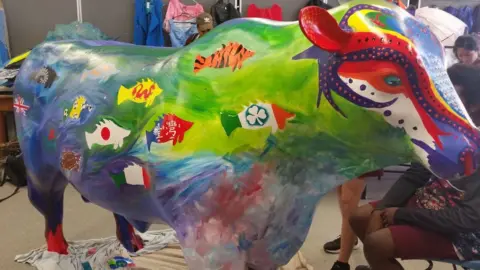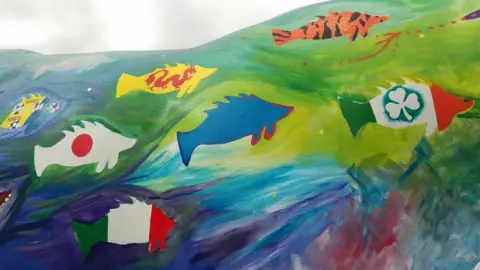Taiwanese flag on bull artwork painted over in Australia
 NADJA LO
NADJA LOAn Australian city council has been criticised after it covered up Taiwanese flags painted by school students on a public artwork.
The flags were painted on a bull statue displayed for a beef industry event in Queensland.
Rockhampton Regional Council said it altered the work to reflect the Australian government's policy of not recognising Taiwan as a country.
China claims sovereignty over Taiwan, which it sees as a breakaway province.
The fibreglass statue was one of six school artworks commissioned by the council and Beef Australia for a week-long festival in Rockhampton, 600km (370 miles) north of Brisbane.
North Rockhampton State School said students had created the design, which featured various national flags in the shape of fish, to celebrate the cultural diversity of their community.
Two Taiwanese-born students painted the Taiwan flag, but last week, the council re-painted them so they were plain blue.
Other flags were not altered. The council said it informed the school of the decision prior to the re-painting.
 YEN CHOU
YEN CHOU"[We] made a decision to change one bull statue on display in Quay Street in line with the Australian Government's approach of adhering to the one-China policy," council representative Tony Cullen told the Australian Broadcasting Corp.
"We highly value the relationship with all of our international trading partners and the opportunities they present for our region," he said.
The central Queensland city is a beef producing capital in Australia. China is one of the country's largest beef export markets.
'Just want to paint our flag'
China is becoming increasingly vocal about any suggestions by political or private entities that self-ruling Taiwan is an independent country.
It recently, for example, insisted that airlines stop listing Taiwan as a country - and not a part of China - on their selection menus. Australian airline Qantas agreed to the changes.
The Taiwanese mother of the students who painted the flags said she was outraged by the council's decision.
"What [the] council did on the art work is not acceptable," Syuan-Si Chen wrote on her daughters' school Facebook page.
"As Australian immigrants, we respect Australia culture and also are proud of our culture background. We just want to paint our flag and not [be] muted."
Ms Chen's friend, Yen Chou, told the BBC she and other Taiwanese residents were disappointed and upset about the council's decision.
"Apparently they [the council] know Chinese can barely see Taiwanese flag anywhere in the world, and they decided to take care of their feelings."
